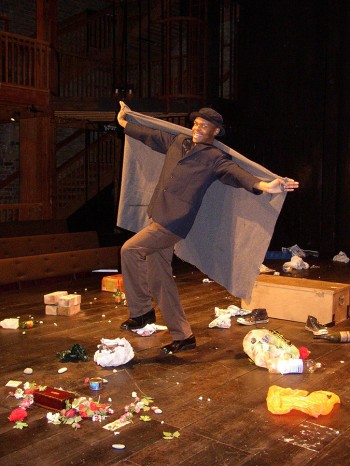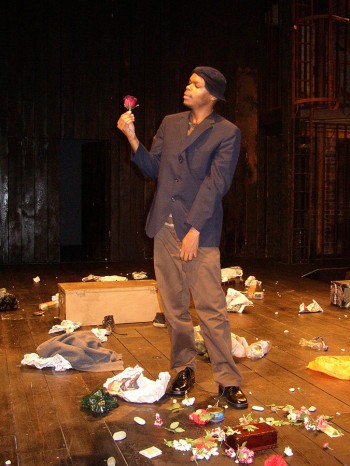A conversation with South African actor and playwright Omphile Molusi

The last few days have involved a lot of air travel for South African artist Omphile Molusi. Having flown from Chicago to South Africa and then onto Perth, he is finally in Adelaide preparing for his one-man show as part of the Adelaide Festival.
“I have to say, I have never experienced such intense heat as that in Perth”, he confesses, “I’m much happier with the rain of Adelaide. It makes me feel at home.”
A prolific writer with over thirty plays to his name, including two works for children, Molusi has been working on Itoseng since 2005.
“I come from the township of Itsoseng (which gives the play its name) and when I left to go to the city and then came back I found that this was a place of unkept promises and stagnation.”
Change is crucial in the world of post-Apartheid South Africa but there is much progress to be made: “Not only because the changes made are inadequate,” emphasizes Molusi, “but because they do not fulfil the promises made to our people.”
Returning to Itoseng after various sojourns to make a city living, Molusi recalled how he and other friends would sit together and ask the ongoing and increasingly relevant question of “WHY?”
“We would talk about why we still didn’t have basic amenities; why problems with clean water still continued to persist, problems with roads”, he stops and then adds with a laugh, “Actually in South Africa it is better to drive off the road than on, ask any local!”
But the seriousness of the situation is confronting and Molusi continues more with sadness than anything else: “Even our shopping complex, a source of employment and a symbol of modernity, was burnt down in 1994, but what is even more tragic is that it has never been rebuilt. It is still a reminder, a scar on the landscape of our town, that we still have not been able to move forward.”
It was discussions such as these that motivated Molusi to write. What began as pages of political rhetoric soon began to take shape. With the inclusion of his friend’s death he found that the story he wanted to tell had become the play he would share with the world.
“I felt that it was through the personal that I would be able to share a political story, one that I think is relevant wherever people are fighting for change. We need to recognize that the kind of change that you fight for is not the change that you were promised and people are affected – often in unexpected ways.”
South Africa is a country that is in transition and Molusi is passionate about his homeland, its beauty and the need for its government to emerge from the stupor in which they have been making cowardly decisions.

“I would love people to visit South Africa,” he says, “I would love people to experience the change that is happening. There is still a lot of work to be done in our country and, because promises have been made that haven’t brought about the necessary change, there is sadly, much hostility and despair.”
But he quickly adds, “We need to move forward, it’s been eighteen years since we had our first black president and where is our country now?”
Having had to write, perform and direct his own work Molusi has been very self-sufficient in carving out his own career, but the journey hasn’t been easy.
“In South Africa funding is a huge problem. Governments simply don’t understand the power of story to catalyse change and those plays that do receive state funding are either pro-government productions or commercialized large-scale musicals.”
The legacy of Apartheid is immediate in the descriptions that Molusi draws, but he also remembers the different literary and dramatic texts that were written at the time.
“Theatre has the power to expose truth and at the time of apartheid politicians knew that the power of the people rested in our ability to communicate with each other through story. Because people listen … Unfortunately the government don’t want to listen and they know that if they do invest in theatre then their ears will be burdened with unpleasant truths” , explains Molusi.
Articulate and evocative Itsoeng has already been greeted with great acclaim in the USA, the UK and Ireland. Australia is sure to be no different. This is an excellent opportunity for locals from Adelaide and festival goers to gain real insight into the cultural and political landscape of South Africa. And what better way than through the voice of Omphile Molusi – the man from Itsoseng?
